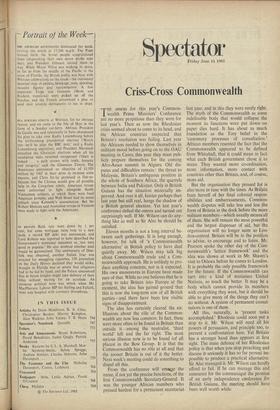Criss-Cross Commonwealth
THE omens for this year's Common- wealth Prime Ministers' Conference are no more propitious than they were for last year's. Then as now the Rhodesian crisis seemed about to come to its head, and the African countries suspected that Britain's resolution was failing. Last year the Africans needed to show themselves in militant mood before going on to the OAU meeting in Cairo; this year they must pub- licly prepare themselves for the coming Afro-Asian summit in Algiers. Old dis- putes and difficulties remain : the threat to Malaysia, Britain's ambiguous position in the whole of Southern Africa, the quarrels between India and Pakistan. Only in British Guiana has the situation materially im- proved. And over it all, fainter perhaps than last year but still real, hangs the shadow of a British general election. Yet last year's conference defied the omens and turned out surprisingly well. If Mr. Wilson can do any- thing like as well as Sir Alec he should be satisfied.
Eleven months is not a long interval be- tween such gatherings. It is long enough, however, for talk of 'a Commonwealth alternative' in British policy to have died quietly away. Mr. Wilson may talk big about Commonwealth trade and a Com- monwealth approach. He is unlikely to pro- duce anything concrete, nor is it expected. His own manceuvres in Europe have made sure of that. While no one believes that he is going to take Britain into Europe at the moment, the idea has gained ground that this is now the long-term aim of all British parties—and there have been few visible signs of disappointment.
The idea has certainly cleared the air. Illusions about the role of the Common- wealth are now less common. In fact, these were more often to be found in Britain than outside it—among the neutralist, 'third world' left and the far right. The most serious illusion now is to be found (of all places) in the Bow Group. It is that the Commonwealth has no role at all and that the sooner Britain is out of it the better. Next week's meeting could do something to dispel all this.
From the conference will enlarge the name, if not yet the precise functions, of the first Commonwealth Secretary-General. It was the younger African members who pressed hardest for a permanent secretariat last year, and in this they were surely right. The myth of the Commonwealth as some indefinable body that would collapse the moment its functions were put down- on paper dies hard. It has about as much foundation as the Tory belief in the 'customary processes of consultation.' African members resented the fact that the Commonwealth appeared to be defined from Whitehall, that it could mean in fact what each British government chose it to mean. They wanted more co-ordination, more information, more contact with countries other than Britain, and, of course, more aid.
But the organisation they pressed for is also more in tune with the times. As Britain frees herself of her final colonial respon- sibilities and embarrassments, Common- wealth disputes will take less and less the form of Britain in the dock before the more militant members—which usually means all of them. She will remain the most powerful and the largest dispenser of aid, but the organisation will no longer seem so Lon- don-centred. Britain will be in the position to advise, to encourage and to listen. Mr. Pearson spoke the other day of the Com- monwealth's 'lattice framework' and the idea was shown at work in Mr. Shastri's visit to Ottawa before he comes to London. It is probably the only possible framework for the future. If the Commonwealth can turn into a kind of miniature United Nations, so much the better. It may be a body which cannot provide its members with everything they want, but it should be able to give many of the things they can't do without. A system of permanent consul- tations is one of them.
All this, naturally, is 'present tasks accomplished.' Rhodesia could soon put a stop to it. Mr. Wilson will need all his powers of persuasion, and principle too, to prevent a confrontation here. Yet Britain has a stronger hand than appears at first sight. The main defence of her Rhodesian policy is that when you stop preaching and discuss it seriously it has so far proved im- possible to produce a practical alternative. Sir Alec managed it. Mr. Wilson can hardly afford to fail. If he can manage this and announce for the communiqué the promise of an early independence conference for British Guiana, the meeting should have been well worth while.


































 Previous page
Previous page